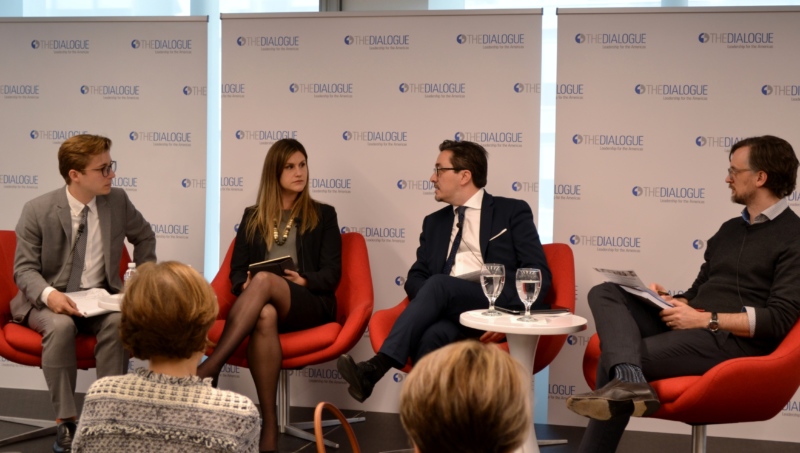Industrial Policy & Innovation in Brazil
Despite an increased presence in the global market, Brazil’s new economic policy shows sign of protectionism and defense of traditional industries.
On April 18, the Inter-American Dialogue in partnership with the OECD Development Centre, CAF—Development Bank of Latin America, the UN Economic Commission for Latin America and the Caribbean, the European Commission, and the Inter-American Development Bank, held an open discussion on how building transparent and effective institutions in Latin America can lead to economic growth and development in the region. The event presented the report titled “Latin American Economic Outlook 2018: Rethinking Institutions for Development” and called for the rethinking of Latin American institutions to strengthen the trust of citizens in their countries’ institutions.
The Dialogue’s president emeritus, Peter Hakim, and the director of the Washington ECLAC office, Inés Bustillo, provided opening remarks in which they presented the partners that contributed to the development of this report. Bustillo also stressed “the admirable poverty reduction rates of Latin America over the past decades,” while expressing her concern for the unmet demands of the growing middle class. Bustillo emphasized that the growing disconnect between the aspirations of the middle class and countries’ capacity to meet these, places Latin America at a critical juncture.
Report diagnosis: growing disconnect between society and public institutions, discontent driven by a rising middle class, low growth and high inequality. One solution for the region: rethinking its institutions #LEO2018 pic.twitter.com/kOPvuPyTxT
— The Inter-American Dialogue (@The_Dialogue) April 18, 2018
Adriana Arreaza from CAF—Development Bank of Latin America, and Angel Melguizo from the OECD Development Centre began by presenting the aforementioned report. Arreaza indicated that trust in Latin America and the Caribbean is deteriorating, as 75% of Latin Americans claimed that they did not trust their governments and 80% perceived their institutions as corrupt. Arreaza contended that this mistrust is weakening the social contract in Latin America, which further fragments social cohesion in the region. Thus, Arreaza endorsed the rethinking of Latin American institutions since the economy of the region has recovered. However, looking forward, this change may face upcoming challenges with the rising global protectionist trends. Following Arreaza, Angel Melguizo posed the productivity and inclusion challenges that persist in Latin America and the Caribbean as further triggers of the disconnect between society and institutions. Melguizo said that “Latin America has not been able to catch up with the world’s productivity rates, causing the region to remain under the middle-income trap.” Hence, he called for the rethinking of institutions to increase the region’s productivity rates and build stronger bonds between society, the market, and the state. As a final point, Melguizo summarized the adjustments for Latin American institutions included in the report: enhancing and augmenting trade integration and productivity; creating more reliable, open, and transparent institutions that deliver and respond to citizens; and creating institutions that embrace innovative and forward-looking perspectives so they are able to adapt to new technologies and ideas.
Our panelists discuss the real impact corruption has on businesses. These costs are a powerful force for change and innovation which could impact how governments approach the challenge moving forward #LEO2018 pic.twitter.com/fnRVkXelN6
— The Inter-American Dialogue (@The_Dialogue) April 18, 2018
After the presentation, Ben Raderstorf moderated a panel discussion with Jennifer Smith from Citi, Max Heywood from Transparency International, and Carlos Santiso from the Inter-American Development Bank. Panelists addressed the solutions and recommendations advanced in the report and how to apply these in a “real-life context.” From a bank’s perspective, Stuart Smith emphasized that corruption in Latin America diverts potential investors from developing projects in the region because it takes away the trust and stability that they need to invest. Stuart Smith also indicated that the weakness of Latin American institutions is a cost for the region as “corruption scandals also bring projects to a halt.” Max Heywood continued to stress the importance of battling corruption and strengthening institutions in Latin America by concluding that the fight against corruption is expensive and difficult, especially when considering there is no evidence that shows a correlation between corruption and economic growth. Finally, Carlos Santiso proposed three takeaways for multilateral institutions from the report. First, Santiso argued that beyond the resilient and structural challenges of corruption that exist throughout Latin America, the everyday bureaucratic corruption that citizens experience lies at the core of the disconnect between society and institutions. These experiences include payments or bribes to public servants in exchange for a service provided appropriately or at all. Second, Santiso stressed that incorporating technology into the government’s services will make institutions more transparent and effective. Finally, he claimed that “we also need to fix the machinery of government,” by hiring workers that are innovative, passionate and that provide good quality services.
Despite an increased presence in the global market, Brazil’s new economic policy shows sign of protectionism and defense of traditional industries.
Which countries in the region are making strides in fighting corruption, and which are falling short?
Organized criminal groups pose an increasing risk to democracy and the rule of law in El Salvador.
 Irene Estefanía González / Inter-American Dialogue
Irene Estefanía González / Inter-American Dialogue

 Video
Video